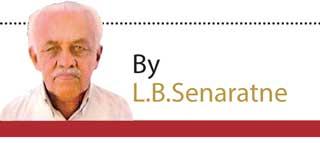Reply To:
Name - Reply Comment
It is said that Ehelepola Kumarihamy took the pounder in her hand and laid it on the mortar to avoid the shame of being handed over to a ‘Gahalaya’
 Having waited two weeks for anyone to give life to Ehelepola Kumarihamy, the Menike of Ehelepola Maha Adikaram who sacrificed her life, her children and above all the Chanter of womanhood, for the sake of her husband and the country, has been forgotten by our women’s organizations and also by the political authorities.
Having waited two weeks for anyone to give life to Ehelepola Kumarihamy, the Menike of Ehelepola Maha Adikaram who sacrificed her life, her children and above all the Chanter of womanhood, for the sake of her husband and the country, has been forgotten by our women’s organizations and also by the political authorities.
Ehelepola Kumarihamy is a Martyr and undoubtedly the icon of Sri Lankan womanhood.
|
Ehelepola Kumarihamy |
Is it because, she knew no English nor hobnobbed with people with foreign influence and that’s why our women’s organizations have forgotten Ehelepola Kumarihamy. She was the wife of Ehelepola, the First Adigar of the 6th Century Kandyana Kingdom.
Ehelepola Kumarihamy was considered the most beautiful woman in the Court of Kandy, surpassing Subamma, the mother of Sri Wickrama Rajasinghe. She was the sister of Maha Adikaram Keppetipola and wife of Disava Ehelepola. Subamma arrived in the Kandyan Kingdom with the nine-year-old Kannaswamy, the usurper to the Kandyan Throne, who became Sri Wickrama Rajasinghe. She was considered as the most beautiful woman in the Kandyan territory. This would have been the reason for Pilimatalawa fostering her and bringing up Kannaswamy, later to be elevated to the throne against the wishes of the Court.
Ehelepola Kumarihamy, rejected the advances of King Sri Wickrama Rajasinghe and in fact ‘ slapped ‘ the King for entering her residence one night, after the King sent Maha Adikaram as the Dissava of Sabaragamuwa out on an official assignment. This was done by purpose so that he could visit the Kumarihamy.
It so happens that the front door of the Palace offers a view to the house of Ehelepola; down Raja Veediya (even presently). It is said that in the mornings Ehelepola Kumarihamy- after a bath wearing Jasmine flowers around her neck- used to sit on the upstairs of the house. The King could see her from his palace doorway. This is how the King desired for here and got slapped when she visited the home of Ehelepola Kumarihamy in the night.
One could opine that King Sri Wickrama Rajasinghe ‘bent the law ‘ (bending the law has its disastrous consequences) for his own ends against the advice of one of his confidantes in Court; Tennakoon Rajapakse Mudiyanselage Punchi Banda. He said that the law didn’t permit children to be pounded. But Molligoda, who had an axe to grind with Ehelepola, read out the order of the King. It is a known fact that the King by this time was a drunkard and whether he really understood Molligoda is questionable.
It was said by British observers at the time that Ehelepola Kumarihamy only took the pounder in her hand and laid it on the mortar. She did this in order to avoid the shame that she would be handed over to a ‘Gahalaya’ (a low-caste person).
Charles Pridham in his book ‘A historical, political and statistical account of Ceylon and its dependencies (Volumes London 1849, pp. 185 - 186) states “Palipane Disawa witnessing the drowning of Ehelepola Kumarihamy and her female relative in the Bogambara Tank was so affected that he fainted and was deprived of his office for showing such tender sensibility”.
He further records, during the two days, the whole of Kandy, with the exception of the court of Sri Wickrama Rajasinghe, was one of mourning. So deep was his grief that not a fire was kindled, nor food dressed and a general fast was held. “This is a clear manifestation to the popularity of Ehelepola Maha Adikaram and Kandyans never reckoned Ehelepola as a traitor. By placing Kannaswamy on the throne, he had other motives and thought young Kannaswamy, who was 18-years-old, could be used as a pawn in his hands. However he was beheaded due to a flimsy suspicion. It is in this background that events took a turn in the Kandyan Court.
Punchi Banda the man who advised the King as his confidante was banished from the inner city. He lived outside in the outer city. The correct place where Ehelepola’s children were beheaded and where the severed heads of her children were to be pounded were in the centre of the area between the Maha Vahalkada of Natha Devale and the flight of steps leading to the Maha Devala or popularly known as Vishnu Devale. This is known as “Deva Sanhinda”. The King sat at the doorway of the Palace and witnessed the barbaric massacre of innocent women and children. The incident did not take place at the Maha Maluwa as many writers portray.